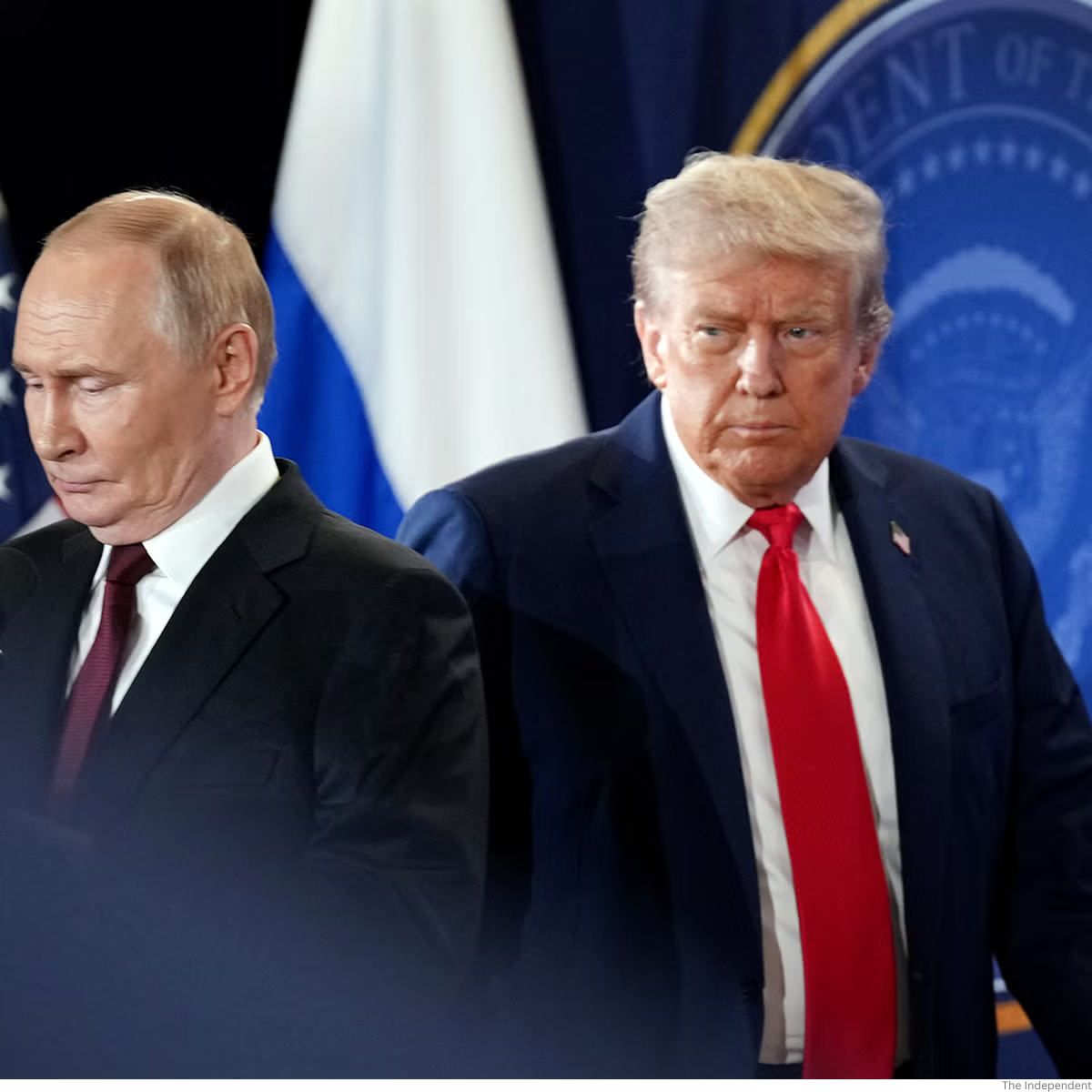President Donald Trump said on October 25 that he does not plan to meet with Russian President Vladimir Putin until a concrete peace deal between Russia and Ukraine appears likely, underscoring a shift in his administration’s approach to the 20-month-old conflict that has dominated global security discussions.
Speaking to reporters aboard Air Force One en route to Kuala Lumpur, Malaysia, Trump emphasized that any future engagement with Moscow must yield tangible progress toward ending hostilities.
“I’m going to have to know that we’re going to make a deal,” Trump told journalists during the mid-flight briefing. “I’m not going to be wasting my time. I’ve always had a very great relationship with Vladimir Putin, but this has been very disappointing.”
The president’s remarks come just days after he canceled a planned summit with Putin in Budapest, Hungary, which was originally intended to advance discussions on a framework for peace in Ukraine. The White House said the decision reflects Trump’s view that further direct talks would be premature without signs of commitment from both Moscow and Kyiv.
A high-stakes diplomatic pause
The cancellation, confirmed on October 21, marked the second major disruption in U.S.-Russia diplomacy in as many months. Trump and Putin last met in August in Anchorage, Alaska, for what was billed as a breakthrough meeting aimed at outlining terms for a potential cease-fire. That summit ended without an agreement, as both sides failed to bridge differences over security guarantees and control of disputed territories in eastern Ukraine.
“I thought this would have gone long before peace in the Middle East,” Trump said Friday. “We have Azerbaijan and Armenia — that was very tough. In fact, Putin told me on the phone, he said, ‘Boy, that was amazing,’ because everybody tried to get that done and they couldn’t. I got it done. You had others. If you look at India and Pakistan. I could say almost any one of the deals that I’ve already done I thought would have been more difficult than Russia and Ukraine, but it didn’t work out that way.”
Trump added that deep divisions between Ukrainian President Volodymyr Zelenskyy and Putin have made progress difficult. “There’s a lot of hatred between the two,” he said.
Context: stalled peace efforts
Since Trump returned to office in January 2025, his administration has prioritized a negotiated settlement to end the war, which began with Russia’s invasion of Ukraine in February 2022. While the intensity of fighting has declined in recent months, the conflict remains unresolved, with Ukrainian forces maintaining control over most major cities and Russia consolidating its hold over Crimea and parts of the Donbas region.
Despite several rounds of shuttle diplomacy led by Secretary of State J.D. Vance and National Security Adviser Richard Grenell, peace talks have stalled over key issues including territorial sovereignty, NATO membership guarantees, and sanctions relief for Moscow.
The U.S. has also sought to balance its pursuit of peace with continued support for Ukraine’s defense capabilities. Congress recently authorized a scaled-down $22 billion assistance package aimed at maintaining Kyiv’s security infrastructure while pressuring both sides toward negotiations.
Trump’s transactional diplomacy
The president’s decision to withhold direct engagement with Putin until a deal is imminent is consistent with his broader transactional approach to foreign policy, which emphasizes results over symbolism.
Throughout his first and second terms, Trump has touted a record of achieving agreements in conflicts that had stymied previous administrations — including cease-fire arrangements in the Caucasus, Gulf normalization pacts, and improved relations between India and Pakistan.
Administration officials said Trump’s refusal to meet without assurances of progress reflects frustration with Russia’s reluctance to offer concessions and growing impatience with Zelenskyy’s refusal to accept limited territorial compromises.
“President Trump believes in dealmaking diplomacy,” one senior White House aide said on background. “He’s willing to talk when there’s a realistic pathway to success, not just for a photo op. Right now, that pathway isn’t there.”
Moscow and Kyiv react cautiously
The Kremlin responded to Trump’s remarks with measured restraint. Russian Foreign Ministry spokeswoman Maria Zakharova said in a statement Saturday that Moscow “remains open to dialogue with the United States when the conditions are conducive to meaningful discussions.”
She added that Russia continues to view U.S. sanctions as “an obstacle to peace” and called on Washington to show “constructive flexibility” in future negotiations.
In Kyiv, officials expressed disappointment at the canceled meeting but downplayed its significance. A senior aide to President Zelenskyy said that Ukraine “values continued U.S. engagement” and understands Trump’s position.
“We have full confidence that President Trump’s commitment to peace will continue through diplomatic channels,” the aide said. “What matters most is that the U.S. remains committed to Ukraine’s sovereignty and independence.”
International reactions and implications
European allies greeted Trump’s comments with a mix of concern and cautious optimism. German Chancellor Annalena Baerbock urged Washington to maintain communication with both sides, warning that a diplomatic vacuum could embolden Moscow.
“Dialogue, even when difficult, is essential,” Baerbock said in Berlin. “But we also recognize that progress requires sincerity from Russia — and that is still lacking.”
Meanwhile, French President Emmanuel Macron welcomed Trump’s insistence on results-driven diplomacy, saying, “It is better to delay a meeting than to hold one that achieves nothing.”
Analysts say the delay could increase uncertainty in global markets and complicate efforts by NATO to coordinate long-term security arrangements in Eastern Europe. Oil prices briefly rose on Friday amid renewed concerns about geopolitical risk in the region.
Looking ahead
Trump’s Asia tour, which includes stops in Malaysia, South Korea, and Japan, is expected to focus on trade and security partnerships in the Indo-Pacific. However, officials said the war in Ukraine will continue to shadow the trip, as U.S. allies seek clarity on Washington’s long-term commitment to European stability.
The president, who has repeatedly said he believes peace in Ukraine is “achievable within months,” faces growing domestic pressure to demonstrate progress before the 2026 midterm elections.
For now, Trump appears determined to hold his ground — and to keep any future meeting with Putin firmly tied to tangible results.
“When there’s a deal, we’ll meet,” he said. “Until then, I’ve got plenty of other work to do.”
%20(4).png)





